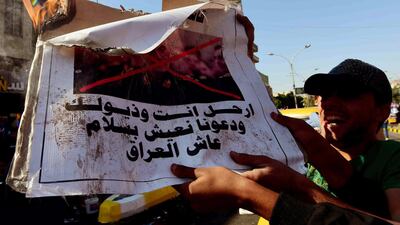Leaked Iranian intelligence documents show the depth of Tehran’s influence in Iraq, especially as anti-government protesters are calling for an end to foreign interference in Iraqi affairs.
The New York Times and online publication The Intercept said they had verified more than 700 pages of reports written in 2014 and 2015 by Iran's Ministry of Intelligence and Security.
The Intercept said it received the documents from a source who wanted "to let the world know what Iran is doing in my country Iraq".
Iraq and Iran have close but complicated ties, but the documents show how Tehran has worked steadily to increase control over its neighbour and intervened at crucial moments.
Gen Qassem Suleimani, head of the Islamic Revolutionary Guard Corps' Quds Force, responsible for foreign operations, is Tehran's point man on Iraq and travels there often during political turmoil.
The documents "offer a detailed portrait of just how aggressively Tehran has worked to embed itself into Iraqi affairs, and of the unique role of Gen Qassem Suleimani", the outlets wrote.
The documents show how the general recruited and mobilised Iraqi militias to defend Iranian interests whenever they were challenged.
Iraq is now witnessing its biggest protests in decades as thousands of people in Baghdad and southern cities against corruption and the lack of jobs and services, while calling for the government of Prime Minister Adel Abdul Mahdi to step down.
The prime minister offered to resign several weeks ago but Gen Suleimani has chaired several meetings in Baghdad and Najaf to ensure he remains stays in power.
One of the leaked Iranian documents says Mr Abdul Mahdi had a "special relationship" with Tehran when he was Iraq's oil minister in 2014.
Another document identifies an aide to former Iraqi parliamentary speaker Salim Al Jubouri as an Iranian intelligence asset.
Iranian officials also cultivated a network of informants who worked for the US after its invasion of Iraq in 2003 that toppled dictator Saddam Hussein.
The withdrawal of US troops in 2011 left Iraqis working with the CIA "jobless and destitute", and Iran was able to use them to gain much more access inside Baghdad, the papers showed.
Tehran's network of spies in Iraq is particularly extensive in the Shiite-dominated south.
In 2014, an Iraqi military intelligence officer travelled from Baghdad to the southern city of Karbala to meet an Iranian intelligence agent and deliver a message from his boss, Lt Gen Hatem Al Maksusi.
It read: "All of the Iraqi army's intelligence – consider it yours".
One former CIA agent, known as “Donnie Brasco”, offered to sell Iran the locations of agency safe houses, information of weapon and surveillance training, and the names of Iraqis who spied for the Americans.
The files also show how Iran increased efforts to counter US influence in Iraq after the 2003 invasion, moving its best agents there.


